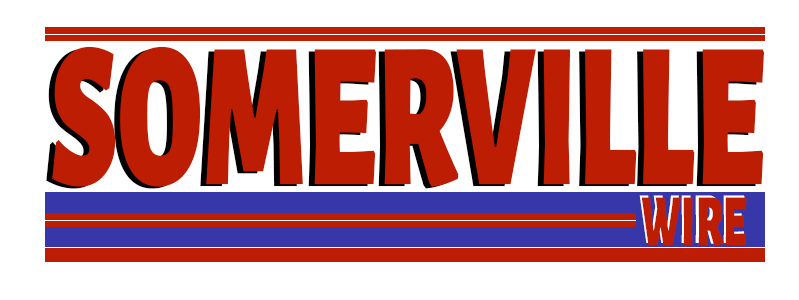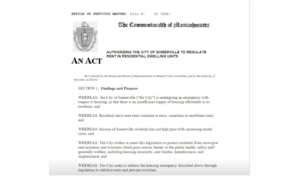Mayoral candidates also weighed in on whether the Commonwealth should build this entity
(Somerville Wire) – Mayor Joe Curtatone voiced his support for the creation of a public bank in the Commonwealth of Massachusetts, on Oct. 26. The Metro Mayors Coalition, a “group of [15] cities and towns in the urban core of Metro Boston,” has expressed its support behind legislation that would create a public bank, which would help small businesses and municipalities in need. Curtatone urged lawmakers to take action, suggesting that recovery from COVID will necessitate the formation of such an institution.
“It’s banking for the public good, not for profit, with our money,” said Curtatone. “… Reinvestment as a public bank would be a critical step towards racial and economic justice, especially as we work towards an equitable recovery from COVID. One of the things I hope we learned from COVID is the glaring spotlight on disparities and inequalities of the whole system, not just the banking system. The structural racism that is stacked into the banking and financing industry is well documented. A public bank would be a powerful tool to start strategically addressing that inequity and the racial gap in Massachusetts.”
According to the proposed legislation, the Commonwealth would capitalize the public bank with $200 million over a period of four years, and it would deposit funds into it through transfers from the Massachusetts Municipal Depository Trust. Curtatone explained that the bank could make low-cost loans to communities, small businesses, and farmers. It would aim to support communities of color and Gateway Cities. Profits could be reinvested in the community, like in energy efficient initiatives. Curtatone said that other banks around the world, particularly the Bank of North Dakota, have shown that while they may operate under different circumstances, they hold similar values and have set a precedent.
Some, such as the Massachusetts Bankers Association, have opposed the legislation, stating that quasi-public agencies that could support small businesses already exist and that attention should be focused on them instead. The organization has also argued that setting up a public bank would be expensive. Curtatone refuted both of these points.
“The facts show. The current system is insufficient,” said Curtatone. “No existing program has both the mission and scale of the public bank. Current quasi-public and community development financial institutions, or CDFIs, cannot meet the needs for what is really flexible, community driven investment by our most vulnerable. A public bank would actually supplement, fill the gaps, and work in partnership with the existing banks … A public bank would not be expensive. It would drive more revenue. The bill proposes a relatively small bank as a pilot program. … I would say that now is the time to establish a structural solution to a structural problem.”
City Councilor Will Mbah, a candidate for mayor, expressed support for the creation of a public bank. Mbah wrote in an email that he believes the formation of one would help minority populations in Somerville.
“I support Mayor Curatone’s call for a public bank, and if I’m elected mayor I look forward to working with the Metro Mayors Coalition to advocate for a public bank that can help small business and municipalities obtain financing,” wrote Mbah in a statement. “If cities can provide transportation and education to residents, there’s no reason we can’t provide financial services to residents. A public bank would especially benefit people of color and marginalized groups who are overlooked by traditional consumer banks and as a result don’t have access to capital and funding that banks provide.”
City Councilor Katjana Ballantyne, the other candidate for mayor, said that she also believes developing a public bank would be a positive step. Its creation would help with different City processes, such as the allocation of grant money.
“I support the idea of a public bank to improve the administration of several short-term, pandemic recovery initiatives, as well as longer-term initiatives,” wrote Ballantyne, in a statement. “A principal challenge in distributing business recovery grants in the past year was the complicated process that excluded some small businesses and required coordinating the requirements of several agencies at various levels. A public bank could simplify these processes, and we could use the set-up process to streamline some redundant requirements and focus the efforts of several existing agencies. A public bank could also handle private foundation and charity funds that supplement locally administered recovery and aid programs. This idea is promising, and if we get it right, it could be a benefit in the short term and the future.”
This article is syndicated by the Somerville Wire municipal news service of the Somerville News Garden project of the Boston Institute for Nonprofit Journalism.
All Somerville Wire articles may be republished by community news outlets free of charge with permission and by larger commercial news outlets for a fee. Republication requests and all other inquiries should be directed to somervillewire@binjonline.org. Somerville Wire articles are also syndicated by BINJ’s MassWire state news service at masswire.news.
SUBSCRIBE TO THE FREE SOMERVILLE WIRE EMAIL NEWSLETTER: https://eepurl.com/hpBYPv
Check out all our social media here: https://linktr.ee/SomervilleWire.
Shira Laucharoen is assistant director of the Boston Institute for Nonprofit Journalism and assistant editor and staff reporter of the Somerville Wire.





